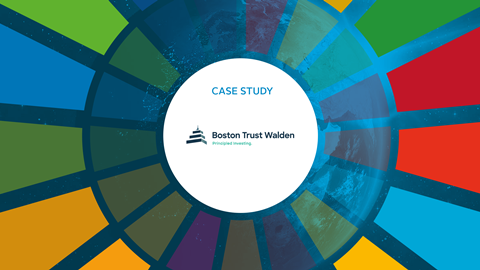Case study by Boston Trust Walden
Signatory type: Investment manager
Operating region: The US
Assets under management: USD 9.4 billion as of September 2019
Using active ownership to promote the SDGs
As a long-term shareholder of publicly traded companies, Boston Trust Walden has worked to strengthen company policies, practices and transparency on key environmental, social and governance (ESG) issues through active ownership. Our active ownership efforts include engaging companies, leading and participating in investor coalitions, filing shareholder proposals, advancing smart public policy and proxy voting.
We recognise the Sustainable Development Goals (SDGs) as an important development in global efforts to end poverty, reduce inequality, protect the natural environment and pursue peace and stability. We believe that the realisation of these goals will be good for our clients, their investments and the global economy and are therefore committed to advancing their objectives. Shareholder engagement is central to our approach.
We have prioritised engagement on a subset of the goals: gender equality (SDG 5), reducing inequalities (SDG 10), responsible consumption (SDG 12), climate action (SDG 13) and peace, justice and strong institutions (SDG 16). The preamble to the SDGs highlights that the goals “are integrated and indivisible and balance the three dimensions of sustainable development: the economic, social and environmental.” The intertwined nature of the goals allows us to focus our engagement efforts and expertise on a handful of the SDG targets and sub-targets, while simultaneously addressing the substance of all 17 goals.
Example: Engaging on SDG 16 - peace, justice and strong institutions
Companies can have an impact on SDG-related issues via their products, the way they manage their supply chains and operations, and how they interact with governments. Corporate public policy advocacy is often overlooked as a mechanism that companies can utilise to foster or block global progress towards achieving the SDGs.
In the US, companies have considerable influence over public policy decisions at the federal and state levels via direct lobbying, as well as through third-party trade associations and think tanks. Business interests have spent over US$34 billion on federal lobbying over the past two decades,[1] yet there is currently no effective mechanism for citizens to monitor the full scope of corporate influence. The Senate Lobbying Disclosure database offers little insight beyond an aggregated quarterly total of money spent, and tracking lobbying at the state or local level adds an additional layer of difficulty. Furthermore, lobbying through trade associations can provide companies with ‘political cover’ and ‘plausible deniability’ when pursuing policies that are unpopular[2] or counter-productive with respect to SDGs.
The current opaque nature of corporate lobbying undercuts US efforts to achieve SDG sub-target 16.6, which aims to “develop effective, accountable and transparent institutions at all levels.” It also indirectly degrades the country’s performance with regards to sub-target 16.7, which aims to “ensure responsive, inclusive, participatory and representative decision-making at all levels.” Unlimited corporate spending on public policy can lead to an unequal representation of corporate interests over the public interest if the political agenda focuses disproportionately on organised groups.[3] This lack of accountability has also allowed companies to champion public policy positions that prevent effective action on other sustainable development goals, such as SDG 13 (climate action). This opacity also exposes companies and their shareholders to risks. For instance, a company may face reputational and/or operational risks if its lobbying activity conflicts with stated company goals or involves the corporation in a public controversy.
Shareholder engagement in the US has been instrumental in encouraging companies to comprehensively disclose their lobbying activities at the state and federal levels, as well as through trade associations and other third parties. Improved transparency on the nature, dollar amount and priorities of company lobbying can foster both corporate and governmental accountability that is consistent with the objective of SDG 16.6.
Along with the American Federation of State, County and Municipal Employees, we co-lead a coalition of more than 70 investors that sponsored at least 33 shareholder resolutions in 2019. These proposals aim to achieve better lobbying policies, oversight and disclosure of direct lobbying, as well as indirect activity through trade associations and think tanks. This initiative prioritises companies that are the largest lobbyists (based on dollars spent) or hold membership in trade associations that frequently take positions at odds with the objectives of corporate sustainability programmes.
In the three years ending December 2018, we engaged directly with 30 companies on their lobbying activities. Of these, nine have strengthened their corporate lobbying policies (e.g. establishing best-practice governance and oversight principles), their corporate practices (e.g. ending ties with a third party organisation involved in lobbying activities that conflict with stated sustainability goals) or their transparency (e.g. disclosing positions on priority issues, self-reporting quarterly spending at the federal and state levels and disclosing spending through trade associations).
While we can only track the impact of engagement at the company level, we believe that comprehensive lobbying disclosure can provide broader public accountability, leading to positive change. We agree with the tenets of Transparency International, which state that “Transparency ensures that public officials, civil servants, managers, board members and businesspeople act visibly and understandably, and report on their activities. And it means that the general public can hold them to account. It is the surest way of guarding against corruption, and helps increase trust in the people and institutions on which our futures depend.”[4]












